Concurrent Sessions: Day One
| Concurrent Session A |
Hard Conversations about Diversity, Inclusion and Equity Done Well
Christopher Ridenhour, Director of Workplace Culture, SpiriTrust Lutheran
If only our professional skill sets and training were enough to create harmony and equity in our organizations. And while our “Offer Letter” encouraged us to bring our “whole selves” to work, each of us, arrived with a distinct world-view, beliefs, biases, and life histories as part of the package (or is that “baggage”?). Let’s jump right in! The idea of the “melting pot” is overused, clichéd, and misinterpreted. The concept of “colorblindness” is problematic and untrue. Just believing that we should all “get along” is an ineffectual strategy that keeps us from achieving the kind of dignity that all team members crave and deserve. How will our most profound conflicts find resolution without a safe space to ask questions and share the beliefs and the experiences that have shaped our attitudes, ideas and actions about “difference.” Work-relevant, highly unique activities, and authentic conversation will bring us closer together to alleviate the heat and embarrassment that accompanies these taboo topics. Isn’t it time for a no-holds-barred experience filled with grace and absent of guilt? Storytelling? Of course. Tears? Possibly. Belly laughs? Count on it. Everyone will leave more competent, confident and committed to operationalizing the tools and systems taught throughout the session.
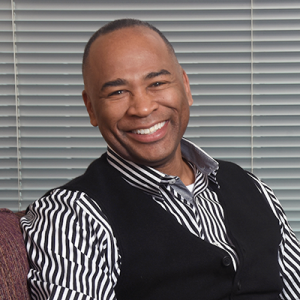 As Director of Workplace Culture for a Pennsylvania-based CCRC and Social Services Management Company, Christopher Ridenhour develops and delivers high-impact staff education focused on World Class Hospitality, Elevated Employee Engagement, New Supervisor Training, Aspects of Inspired Leadership, and Total Team Commitment, among other critical employee competencies. As Director of Workplace Culture for a Pennsylvania-based CCRC and Social Services Management Company, Christopher Ridenhour develops and delivers high-impact staff education focused on World Class Hospitality, Elevated Employee Engagement, New Supervisor Training, Aspects of Inspired Leadership, and Total Team Commitment, among other critical employee competencies.
For the last 16 years, Christopher has traveled across North America and Canada keynoting and training for National Aging Associations including Pioneer Network (led numerous sessions including Plenary), LeadingAge, American College of Health Care Administrators, American Health Care Association, National Center for Assisted Living, and the Ontario Association for Non-Profit Homes and Services for Seniors. Extraordinary participant evaluations have resulted in earning the distinction of becoming LeadingAge’s highest-rated speaker/trainer. As recognition for his years of service to hundreds of communities across Pennsylvania and the country, in 2015, Christopher was awarded LeadingAge’s Facilitator of the Year. |
A Practical Guide to Engaging in Dementia Friendly Communities
Rachel Neal, Programs Coordinator, Person Centred Universe
Jim Kinsey, Vice President of Continuum Care Services, Planetree International
There are 50 million people living in our world with dementia. Many of them are living in our communities and accessing businesses and services to complete activities of daily living to remain independent within their community. With the population of people who are diagnosed with dementia only expected to rise, it is important we learn how to best support these individuals through dementia-friendly culture and design changes. In this session, the presenters will provide practical ways to inform dementia inclusive environments, and provide a look into what it’s like to live with dementia in the community.
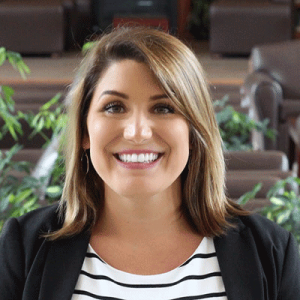 Rachel Neal serves as Programs Coordinator at Person Centred Universe, a consulting and educational training company, that aims to make the world a better place for those living with dementia. Following completion of her Bachelor of Arts Degree, majoring in Gerontology at St. Thomas University, Rachel participated in an ‘Aging in the Life Course’ summer study program from the University of Graz in Austria. Rachel has worked in the long-term care field, specifically with persons living with dementia, for ten years, using her passion to work towards person centred culture change in the field of dementia. She has been an active volunteer for the Alzheimer Society of New Brunswick (Canada) for three years, facilitating support groups and educational/social events for people living with dementia and their loved ones. Through her work at Person Centred Universe, Rachel has developed content and taught several courses on topics such as: Activity Professionals, Dementia Education, and Dementia Friendly Communities. Most recently, she has developed a curriculum for businesses looking to better serve those living with dementia. Rachel has worked on projects relating to the field of dementia that range from creating/influencing dementia inclusive environments to coordination of Provincial Alzheimer Enhancing Care Conferences. Rachel Neal serves as Programs Coordinator at Person Centred Universe, a consulting and educational training company, that aims to make the world a better place for those living with dementia. Following completion of her Bachelor of Arts Degree, majoring in Gerontology at St. Thomas University, Rachel participated in an ‘Aging in the Life Course’ summer study program from the University of Graz in Austria. Rachel has worked in the long-term care field, specifically with persons living with dementia, for ten years, using her passion to work towards person centred culture change in the field of dementia. She has been an active volunteer for the Alzheimer Society of New Brunswick (Canada) for three years, facilitating support groups and educational/social events for people living with dementia and their loved ones. Through her work at Person Centred Universe, Rachel has developed content and taught several courses on topics such as: Activity Professionals, Dementia Education, and Dementia Friendly Communities. Most recently, she has developed a curriculum for businesses looking to better serve those living with dementia. Rachel has worked on projects relating to the field of dementia that range from creating/influencing dementia inclusive environments to coordination of Provincial Alzheimer Enhancing Care Conferences.
|
The “Resident Experience” Before and During COVID-19 described by Residents
Bob Sherwood, Resident, Shenandoah Valley Westminster Canterbury
Judi Booker, Resident, Shenandoah Valley Westminster Canterbury
Mary Jane Lee, Resident, Shenandoah Valley Westminster Canterbury
Last year, residents of Westminster Canterbury in Winchester, VA initiated exploration of the “resident experience” there. Only residents fully understand this unique and little studied experience. They alone know what it’s like to move into a community and live there together with others until the end of their lives. A report of findings was planned to help trustees and employees, who do not live there, do their jobs better. They were looking forward it, but COVID-19 halted the project. This background frames insights the session offers on ways “resident experience” is shifting under pandemic conditions. Future implications are hesitantly suggested.
Living together in community until the end of our lives is a unique and little-studied experience. To search out the Resident Experience, residents at Westminster Canterbury initiated a cross-campus exploration through which the entire community — from trustees to housekeepers – gained insights that are helping to enrich our Resident-Directed Culture. That was before COVID-19 changed life for everyone. Join this session presented by three Independent living residents to hear from their perspective about life in a senior living community before COVID-19 struck and a view from the inside as we have all learned to adapt to the restrictions and challenges faced by this disease.
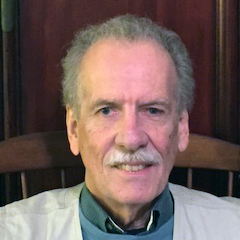 Bob Sherwood, who during his business career served a major international corporation as area general counsel, business planner and public affairs officer, is a resident at Westminster Canterbury, a CCRC in Winchester VA. Over the past 10 years, he has taken a lead in moving the organization toward resident-directed culture and continues to work for culture change at Westminster Canterbury, involving trustees and staff as well as residents. Bob has shared his work on this journey at several Pioneer Network conferences. He served as the first and only resident member of the Pioneer Network Board of Directors from 2012-17 and currently serves on the Education Committee. Bob Sherwood, who during his business career served a major international corporation as area general counsel, business planner and public affairs officer, is a resident at Westminster Canterbury, a CCRC in Winchester VA. Over the past 10 years, he has taken a lead in moving the organization toward resident-directed culture and continues to work for culture change at Westminster Canterbury, involving trustees and staff as well as residents. Bob has shared his work on this journey at several Pioneer Network conferences. He served as the first and only resident member of the Pioneer Network Board of Directors from 2012-17 and currently serves on the Education Committee.
|
With the Right People: How a Statewide Collaborative Created Change
Danielle Watford, Director of Quality and Regulatory Affairs, Maine Health Care Association
Adapting is inevitable and under enough pressure, change happens. The Maine Partnership to Improve Dementia Care is such an example of change drivers. Beginning in early fall of 2018, caregivers from across the state set out to prepare a change package that would assist Maine nursing homes with resources to better care for residents living with dementia, reduce the use of off label anti-psychotic medications and improve the overall care in our communities. This highly adaptive and inherently creative group set out to develop tools but created a much more dynamic and sustainable product in the end. When the right people are brought together in constructive ways, they can create powerful visions and robust strategies. This session will focus on how this Maine partnership developed a change package that was evidence-based and critical to the improvement of our nursing home communities.
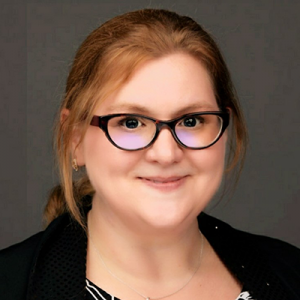 Danielle Watford currently serves as the Director of Quality Improvement and Regulatory Affairs for Maine Health Care Association and Vice President for the Maine Alliance for Resident Centered Care, the Maine culture change coalition. She has served as an advocate for Maine elders living in LTC for the past 15 years by participating in the coalition and serving as the nursing home task lead for Maine’s quality improvement organization. Danielle has served on several planning boards focused on improvement of long- term care services and supports, including the Maine Council on Aging, Maine Dementia Care Partnership and Maine LTCSS Steering Committee. Danielle holds a master’s degree in clinical psychology and industrial/organizational psychology. Danielle Watford currently serves as the Director of Quality Improvement and Regulatory Affairs for Maine Health Care Association and Vice President for the Maine Alliance for Resident Centered Care, the Maine culture change coalition. She has served as an advocate for Maine elders living in LTC for the past 15 years by participating in the coalition and serving as the nursing home task lead for Maine’s quality improvement organization. Danielle has served on several planning boards focused on improvement of long- term care services and supports, including the Maine Council on Aging, Maine Dementia Care Partnership and Maine LTCSS Steering Committee. Danielle holds a master’s degree in clinical psychology and industrial/organizational psychology. |
One’s Mindset Determines If Regulations or Payment Support Person-centered Care
David Gifford, Senior Vice President for Quality and Regulatory Affairs and Chief Medical Officer, American Health Care Association/National Center for Assisted Living
Regulations, payment models and Five-Star measures dominate the nursing home setting. The mindset one brings to the table determines how these federal policies impact the care provided to residents as either driven by a person-centered care mindset or a compliance mindset. This session will explore how to not fall into a compliance mindset.
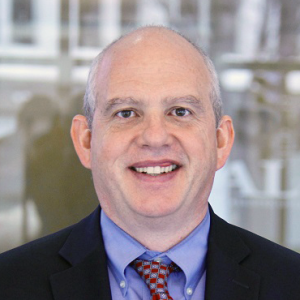 David Gifford, MD, MPH, is a geriatrician who currently serves as the Senior Vice President for Quality and Regulatory Affairs and Chief Medical Officer at the American Health Care Association/National Center for Assisted Living. He oversees the Quality Department, which assists providers in their quality improvement efforts and works with administration officials on regulations and policies impacting the profession. Dr. Gifford serves on the Boards of the Advancing Excellence Long-term Care Collaborative and the Baldrige Foundation. He also chairs the U.S. Department of Veteran’s Affairs Geriatric and Gerontology Advisory Committee, a congressional chartered committee to advise the U.S. Secretary of Veteran’s Affairs and Congress on geriatric services for veterans. Dr. Gifford has served on numerous federal expert panels, including the CMS panel to develop the Quality Assurance & Performance Improvement program for nursing homes. He is a former Director of the Rhode Island Department of Health, where he received the National Governor’s Distinguished Service Award for State Officials for his management of the H1N1 influenza outbreak. In this role, he revamped the nursing home survey process to promote person-centered care practices. Prior to that, he served as Chief Medical Officer for Quality Partners of Rhode Island, where he directed the CMS national nursing home-based quality improvement effort. David Gifford, MD, MPH, is a geriatrician who currently serves as the Senior Vice President for Quality and Regulatory Affairs and Chief Medical Officer at the American Health Care Association/National Center for Assisted Living. He oversees the Quality Department, which assists providers in their quality improvement efforts and works with administration officials on regulations and policies impacting the profession. Dr. Gifford serves on the Boards of the Advancing Excellence Long-term Care Collaborative and the Baldrige Foundation. He also chairs the U.S. Department of Veteran’s Affairs Geriatric and Gerontology Advisory Committee, a congressional chartered committee to advise the U.S. Secretary of Veteran’s Affairs and Congress on geriatric services for veterans. Dr. Gifford has served on numerous federal expert panels, including the CMS panel to develop the Quality Assurance & Performance Improvement program for nursing homes. He is a former Director of the Rhode Island Department of Health, where he received the National Governor’s Distinguished Service Award for State Officials for his management of the H1N1 influenza outbreak. In this role, he revamped the nursing home survey process to promote person-centered care practices. Prior to that, he served as Chief Medical Officer for Quality Partners of Rhode Island, where he directed the CMS national nursing home-based quality improvement effort. |
| Concurrent Session B |
B1
Envisioning the Future: Through the Eyes of Team Members
Moderator: Jennifer Craft-Morgan, Associate Professor, Gerontology Institute at Georgia State University
Panelists:
Jenny Brown, Director of Recreation at Village of Aspen Lake
Vicky Buckhannon, CNA, Fair Haven, Birmingham, AL
Brigitte Marc, LPN, Park Springs, Atlanta, Georgia
Team members working in residential care settings over the past few months have been faced with the need to keep caring, even through unbelievable circumstances. Jennifer Craft-Morgan welcomes four care givers from different settings, leading them in discussion as they tell their stories and reveal lessons learned that will help as we shape the future for team members.
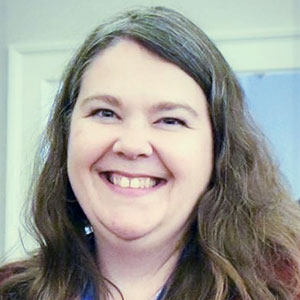 Jennifer Craft Morgan, PhD is an Associate Professor at the Gerontology Institute at Georgia State University in Atlanta, Georgia. Her research focuses on jobs and careers, attempting to understand how policy, population, workplace and individual level factors shape how work is experienced and how work is organized across care settings. She is a national expert on recruitment, training and retention of frontline health care workers highlighting the impact of good jobs and high-quality training. Dr. Morgan has published widely in highly-ranked peer reviewed journals, authored many reports and translational tools, and has presented extensively at a variety of regional and national conferences. She has been principal investigator or co-principal investigator of twelve grant-funded workforce-related research projects. She is currently President of the Southern Gerontological Society and co-chair of the Carework Network. Jennifer Craft Morgan, PhD is an Associate Professor at the Gerontology Institute at Georgia State University in Atlanta, Georgia. Her research focuses on jobs and careers, attempting to understand how policy, population, workplace and individual level factors shape how work is experienced and how work is organized across care settings. She is a national expert on recruitment, training and retention of frontline health care workers highlighting the impact of good jobs and high-quality training. Dr. Morgan has published widely in highly-ranked peer reviewed journals, authored many reports and translational tools, and has presented extensively at a variety of regional and national conferences. She has been principal investigator or co-principal investigator of twelve grant-funded workforce-related research projects. She is currently President of the Southern Gerontological Society and co-chair of the Carework Network.
|
Engagement Elixir: Enhancing Communication Experiences for People Living with Memory Impairment
Lia Levitt, CEO & Founder, Ain’t She Sweet, LLC
Conversational savvy is a learned behavior and for many, a lifelong evolution of ingenuity. Conversing with and truly engaging those living with dementia and memory-related impairment is challenging for senior living community staff, medical professionals, family, and friends. Much of the communications towards those with memory impairment tends to be tactical or focused on the support of activities of daily living. Through multiple levels of disease progression, there are strategies to engage even those who have become non-verbal, in meaningful relationships. The art of asking questions, sharing meaningful stories, and creating sensory experiences is not inherent, it is learned. Practicing these skills and taking a glimpse into a frustrating but important world, will offer a journey towards comfortable communication strategies for engaging, comforting, redirecting, and supporting others. Memory loss does not have to end deep connection, but it does alter ways to sustain it. For those striving to support, start and maintain relationships with those experiencing memory impairment, this session will provide dynamic strategies to connect while continuing to care.
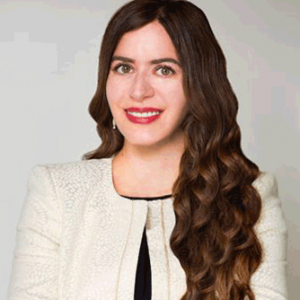 Lia Jill Levitt, M.Phil., M.S., CDP, Founder & CEO of Ain’t She Sweet, LLC “grew up” in a nursing home for 19 years alongside her blind grandmother, who lived to age 99. Lia left a successful fifteen-year career in training and leadership development to write her (hopefully one day published) memoir and founded a corresponding company devoted to bringing joy to the lives of elders and those who care for them. She is devoted to immersing herself in the field of dementia research and senior living and earned her Certified Dementia Practitioner Credential in 2019. Lia has earned graduate degrees from the University of Pennsylvania in Organizational Consulting & Executive Coaching and from Manhattanville College in Leadership & Strategic Management. Her undergraduate degree is in Communications with concentration in Human Relations. Lia is a global citizen who has traveled to 60 countries. She volunteers for organizations such as the Alzheimer’s Association as a support group leader co-facilitating a support group in Darien, Sandy Hook Promise and a national Virtual Center, where she leads interactive video programs for homebound elders. She is fervently committed to redefining the conversation on aging. Lia Jill Levitt, M.Phil., M.S., CDP, Founder & CEO of Ain’t She Sweet, LLC “grew up” in a nursing home for 19 years alongside her blind grandmother, who lived to age 99. Lia left a successful fifteen-year career in training and leadership development to write her (hopefully one day published) memoir and founded a corresponding company devoted to bringing joy to the lives of elders and those who care for them. She is devoted to immersing herself in the field of dementia research and senior living and earned her Certified Dementia Practitioner Credential in 2019. Lia has earned graduate degrees from the University of Pennsylvania in Organizational Consulting & Executive Coaching and from Manhattanville College in Leadership & Strategic Management. Her undergraduate degree is in Communications with concentration in Human Relations. Lia is a global citizen who has traveled to 60 countries. She volunteers for organizations such as the Alzheimer’s Association as a support group leader co-facilitating a support group in Darien, Sandy Hook Promise and a national Virtual Center, where she leads interactive video programs for homebound elders. She is fervently committed to redefining the conversation on aging. |
Becoming Community Builders
Jill Vitale-Aussem, President & CEO, The Eden Alternative
Imelda Maurer, Director & Founder, In Service to Our Own
The person-directed care movement has made great strides in promoting individual preferences and autonomy. Taking this concept further requires creating environments where Elders not only make decisions about their own lives but have an opportunity for true influence on the culture and operations of the community. The current model of senior living is one of service and hospitality, turning those receiving services into consumers. In this session, we will explore bringing Elders (and those who support them) back to citizenship and creating communities where healthy norms exist and everyone has accountability to the whole.
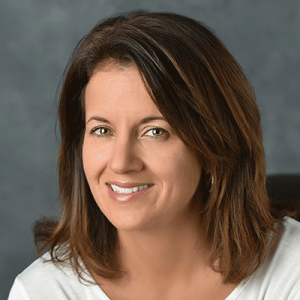
For over two decades, Jill Vitale-Aussem has made changing the culture of nursing homes, assisted living communities and retirement communities her life’s work as a nursing home administrator, CCRC executive director and vice president of operations. In each role, Jill pushed back against the status quo and drove deep cultural transformation in both for-profit and non-profit organizations. These efforts not only improved the quality of life for the people who lived and worked in her communities but led to significant improvements in occupancy, financial and regulatory outcomes. Jill now serves as President & CEO of The Eden Alternative, an international non-profit dedicated to creating quality of life for elders and their care partners, no matter where they may live. The Eden Alternative has impacted the lives of people in sixteen countries around the world. Jill is the author of Disrupting the Status Quo of Senior Living: A Mindshift and speaks internationally on the topics of culture, leadership and ageism. Sr. Imelda Maurer |
Enhancing Person-Centered Care Practice for People Living with Dementia
Tena Alonzo, Director of Education & Research, Beatitudes Campus
Amy Kotterman, Director of Hospitality, United Church Homes
This session will identify and discuss enhanced, person-centered programming for people living with dementia. Methods for engaging all organizational staff in creating adaptations that promote quality person-centered living will be covered. Experts will share specific strategies for integrating enhanced, person-centered care across a senior living organization with multiple, unique sites. Positive outcomes for individuals living with dementia, their families, healthcare staff and organizations will be discussed. A basic method for implementing a next level person-centered care program in other organizations will be shared.
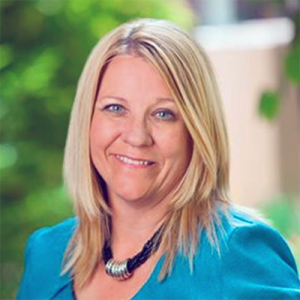 Tena Alonzo currently serves at the Director of Education and Research for Comfort Matters, a dementia care education program founded at the Beatitudes Campus in Phoenix, Arizona. To date, Comfort Matters has educated more than 10,000 health care staff including physicians, social workers, nurses, certified nursing assistants, recreation therapists, environmental and food service professionals across the campus and in 22 countries. Tena has a background in gero-psychology with multiple degrees from Northern Arizona University. Tena Alonzo currently serves at the Director of Education and Research for Comfort Matters, a dementia care education program founded at the Beatitudes Campus in Phoenix, Arizona. To date, Comfort Matters has educated more than 10,000 health care staff including physicians, social workers, nurses, certified nursing assistants, recreation therapists, environmental and food service professionals across the campus and in 22 countries. Tena has a background in gero-psychology with multiple degrees from Northern Arizona University.
|
Tap into Something Deeper: Clinical Art Therapy & Personalized Music Together
Deborah Ferris, Founder & CEO, Thriving4Life
Angel Duncan, Director, Graduate Art Therapy & Counseling Dept/Faculty, Albertus Magnus College
Brian LeBlanc, Board Member & International Alzheimer’s Advocate, Thriving4Life
Discover what happens when you bring two life-changing, evidence-based, companion programs together. Clinical art therapy is not an “arts and crafts” program used for distraction purposes; it is a dignifying, fine arts program used for self-expression while stimulating brain activity. Personalized music rates #1 as the only stimulus that activates the entire brain. Our most personal life experiences and memories, intertwined with our music, are “tucked safely away” in the last part of the brain affected by dementia. Together, these programs validate the arts as an effective and innovative approach in promoting health, improved treatment outcomes, wellbeing and quality of life.
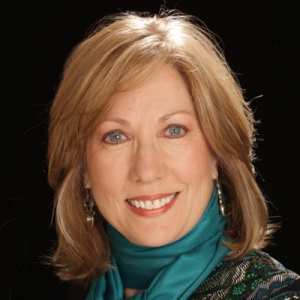 Deborah Ferris is the Founder & CEO of Thriving4Life, Inc, a nonprofit organization that helps individuals and those that care for them to thrive and be the best version of themselves. By providing access to a suite of high quality, field-tested, therapeutic, non-pharmacological programs, resources, education, training, services, and support, Thriving4Life makes navigating through options easier and more efficient for health care professionals and at-home family caregivers. Deborah spent six years managing 9 states as the Music & Memory® Southeastern U.S. Regional Director promoting awareness of the therapeutic impact of personalized music for individuals with cognitive, mental, intellectual and physical challenges. Impassioned by her mother’s 16-year Alzheimer’s journey, Deborah’s work has included collaborating with clinical teams, designing and conducting web-based trainings and presentations, designing program foundation and implementation resources, consulting with corporations and state agencies to secure program funding, engaging with health and elder care professionals, community organizations, dementia support entities, and at-home family caregivers. Deborah is also the Managing Owner of Thriving4Life Consulting, LLC providing the required seminar for those pursuing Certified Dementia Practitioner® certification through the National Council of Certified Dementia Practitioners. Deborah is a Certified Montessori Dementia Care Professional licensed through the International Council of Certified Dementia Practitioners. Deborah Ferris is the Founder & CEO of Thriving4Life, Inc, a nonprofit organization that helps individuals and those that care for them to thrive and be the best version of themselves. By providing access to a suite of high quality, field-tested, therapeutic, non-pharmacological programs, resources, education, training, services, and support, Thriving4Life makes navigating through options easier and more efficient for health care professionals and at-home family caregivers. Deborah spent six years managing 9 states as the Music & Memory® Southeastern U.S. Regional Director promoting awareness of the therapeutic impact of personalized music for individuals with cognitive, mental, intellectual and physical challenges. Impassioned by her mother’s 16-year Alzheimer’s journey, Deborah’s work has included collaborating with clinical teams, designing and conducting web-based trainings and presentations, designing program foundation and implementation resources, consulting with corporations and state agencies to secure program funding, engaging with health and elder care professionals, community organizations, dementia support entities, and at-home family caregivers. Deborah is also the Managing Owner of Thriving4Life Consulting, LLC providing the required seminar for those pursuing Certified Dementia Practitioner® certification through the National Council of Certified Dementia Practitioners. Deborah is a Certified Montessori Dementia Care Professional licensed through the International Council of Certified Dementia Practitioners.
As an individual diagnosed with Early Onset Alzheimer’s as well as Vascular Dementia, Brian provides a window into the journey of a regular guy, from a regular life who is living with a progressive brain disease. Brian leans on the profound impact that his personalized music playlist has on his life. Not only does it drastically decrease what he calls his “brain fog,” it also reduces anxiety when he travels, brings back fond memories and identity, and helps him remain more present and functioning at the highest level possible. |
| Concurrent Session C |
Envisioning the Future: A Global Perspective
Moderator: Benjamin Surmi, Director of People and Culture, Koelsch communities
Panelists:
Sally Hopkins, Executive Director of the Eden Alternative in Australia, New Zealand and Southeast Asia
Josep de Marti, Lawyer and Gerontologist. Founder of Inforesidencias.com., Spain
Cheryl George, Eden Alternative Regional Coordinator for Western Canada, Saskatoon, Saskatchewan
Risa Morimoto, Director, Producer, Founder of Modern Aging
Aging is something shared by individuals in every corner of the globe. Benjamin Surmi will moderate a lively discussion where innovators from around the world will share stories of what is happening, promising innovations and explore how we can work together across international lines to move the future for aging forward.
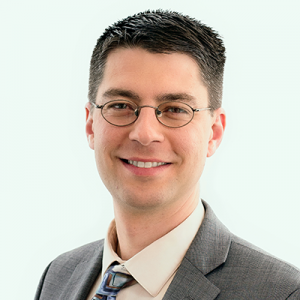 Empowering people to thrive “no matter what disability or cognitive disorder they may live with“ is the focus of Benjamin Surmi’s work as a social gerontologist. Caregiver, activity director, lifelong learning center director, and home repair coordinator were each roles that shaped his understanding of the unique needs of seniors. He guides the person-centered training for over 2,400 employees in 8 states and is currently implementing an evidence-based approach to care from France called Humanitude. Benjamin coaches 70+ wellness directors who support over 1,500 seniors. His passion is imagining the impossible and building alliances that make it possible. Empowering people to thrive “no matter what disability or cognitive disorder they may live with“ is the focus of Benjamin Surmi’s work as a social gerontologist. Caregiver, activity director, lifelong learning center director, and home repair coordinator were each roles that shaped his understanding of the unique needs of seniors. He guides the person-centered training for over 2,400 employees in 8 states and is currently implementing an evidence-based approach to care from France called Humanitude. Benjamin coaches 70+ wellness directors who support over 1,500 seniors. His passion is imagining the impossible and building alliances that make it possible.
Risa made several documentary films, lucky enough to travel and interview people from all over the world. Her films screened at numerous film festivals and aired on television in over 18 countries. Throughout this time, Risa was a part time caregiver to her mother who developed Parkinson’s disease in 2009 and it became increasingly difficult to care for her. Risa felt like she needed a PhD to navigate the healthcare system. This proved to be hugely challenging and Risa often traveled to Japan to look for solutions. She knew their senior population was exploding and they were implementing some innovative ways to address the situation. Modern Aging was born out of Risa’s frustration knowing that there had to be a better way to age and care for our elders, and that the current system was not sustainable for future generations. She used her skills as a documentary filmmaker to interview people and share what she was learning. Thus, Modern Aging was created.
As the Executive Director of Tabor Village, Dan Levitt shepherds the enhancement of social, spiritual and care needs for more than 300 seniors, inspiring a team of over 400 employees and volunteers with a commitment to continuously improving the quality of life. Dan is an Adjunct Professor in Gerontology at Simon Fraser University an Adjunct Professor, School of Nursing, University of British Columbia and a Sessional Instructor, British Columbia Institute of Technology. Dan’s adventure exploits have taken him from Africa’s highest peak Mt. Kilimanjaro to the Caribbean Sea’s coral reefs, from canoeing across the Yukon to racing in the six World Marathon Majors.
|
Slam the Door on Institution (and COVID by the way…)
Megan Hannan, Executive Leader, Action Pact
LaVrene Norton, Action Pact Founder, Executive Leader
Household organizations are best suited to offer a drastically different living experience than the typical long-term care institution. Typical skilled nursing households have a front door that can literally be closed to all who do not live or work in the household. They have private rooms, and multiple rooms in the living center (often a living room and a formal lounge, a den, a sun porch, family dining room, private back yard) – all can contribute to the continuation of a good life within an intimate group of householders and team members.
The household model, a more self-directed option for residential living, has shown that the elders that they serve don’t get as sick, regain skills, and maintain relationships all within the comfort of home as they define it. Households are also ideal for preventing spread of infection and even COVID.
Households also have a fully functioning kitchen and a large pantry that could accommodate a week’s food.
Couple all of the physical amenities with the practices of cross-trained consistent staff (including a house nurse), self-led team skills and strong critical thinking skills and wonderfully, these self-sufficient households are surrounded by all the resources they will need close at hand, and yet able to be kept at arms’ length!
What can your organization do to move closer to this ideal? Creativity, enthusiasm, upbeat attitude, strong action planning and an empowered resident, staff, family community can make this happen. Get started NOW!
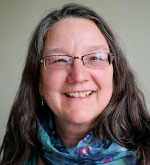 Megan Hannan leads a team of consultants who provide insight and support for transforming institutional culture, especially toward establishing the Household Model. Her expertise focuses on facilitating change through the high involvement of staff, families and residents, and fostering their collaboration in self-led teams dedicated to growing a vibrant life with and for people living with dementia. She has held leadership roles as a mentor with Eden Alternative International and as an executive board member with Pioneer Network. She is called upon to present at numerous state, national and international conferences, including the World Congress on Alzheimer’s and the Eden Alternative International Conference. Megan developed PersonFirst®, Action Pact’s signature train-the-trainer program, and the workbook and video entitled, “Becoming Who They Were.” Megan Hannan leads a team of consultants who provide insight and support for transforming institutional culture, especially toward establishing the Household Model. Her expertise focuses on facilitating change through the high involvement of staff, families and residents, and fostering their collaboration in self-led teams dedicated to growing a vibrant life with and for people living with dementia. She has held leadership roles as a mentor with Eden Alternative International and as an executive board member with Pioneer Network. She is called upon to present at numerous state, national and international conferences, including the World Congress on Alzheimer’s and the Eden Alternative International Conference. Megan developed PersonFirst®, Action Pact’s signature train-the-trainer program, and the workbook and video entitled, “Becoming Who They Were.”
|
Supporting Team Growth: Giving and Receiving Feedback
Anna Ortigara, Former Work Innovations Consultant, PHI
Emily Dieppa, Workforce Innovations Consultant, PHI
Cassandra Martin-Himmons, Workforce Development Specialist, PHI
PHI’s Coaching Supervision® lays out skills and values that foster team and individual staff members growth. This session will explore the key coaching skills of giving and receiving feedback. We are called on to be open to understanding the impact of our actions and to give supportive feedback to each other. Feedback can be used for performance improvement or to share the impact of someone’s behavior. When we experience a negative impact as the result of someone’s behavior, communication becomes challenged. Giving feedback and being open to receiving feedback creates pathways for healthy and reciprocal relationships.
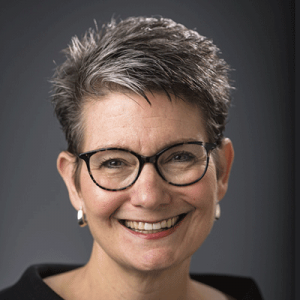 Anna Ortigara has co-created workforce models and person-directed living models over the course of her long-term care career. She served as the VP of Cultural Transformation for Leading Age Illinois and Director of Program Development for THE GREEN HOUSE® Project – National Team. Programs developed include LEAP for the 21st Century long term care workforce (MatherLifeways Center on Aging, Evanston, IL), Person-centered dementia care education and leadership programs (Rush Alzheimer’s Disease Center, Chicago), THE GREEN HOUSE® Project Core Team Education (THE GREEN HOUSE® Project- National Team), Coaching Approach to Supervision and workforce recruitment and retention projects (PHI, Bronx, NY). Anna is a gerontological nurse and a Fellow in the Academy of Nursing and served on the Pioneer Network Board for 6 years and as President for two years. Anna Ortigara has co-created workforce models and person-directed living models over the course of her long-term care career. She served as the VP of Cultural Transformation for Leading Age Illinois and Director of Program Development for THE GREEN HOUSE® Project – National Team. Programs developed include LEAP for the 21st Century long term care workforce (MatherLifeways Center on Aging, Evanston, IL), Person-centered dementia care education and leadership programs (Rush Alzheimer’s Disease Center, Chicago), THE GREEN HOUSE® Project Core Team Education (THE GREEN HOUSE® Project- National Team), Coaching Approach to Supervision and workforce recruitment and retention projects (PHI, Bronx, NY). Anna is a gerontological nurse and a Fellow in the Academy of Nursing and served on the Pioneer Network Board for 6 years and as President for two years.
|
Envisioning the Future of Preference Fulfillment
Karen Eshraghi, Quality Improvement Project Manager, Abramson Center for Jewish Life
Victoria Crumbie, Director of Recreation, Abramson Center for Jewish Life
Alex Heppner, Project Manager, Miami University
In this session, we will share how a deep understanding of resident preferences helped our community respond to the challenge of providing person-centered care during the pandemic and provide a demonstration of Care Preference Assessment of Satisfaction or ComPASS. ComPASS is a new website supporting efforts to track important preference information for your residents/clients with reporting features to support care planning processes. Additionally, we will offer examples of ways our community utilizes these reports for quality improvement processes. Attendees will have free access to all resources discussed during the session.
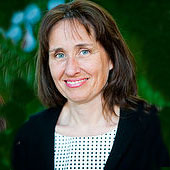 Karen Eshraghi, MSW, received her Bachelor’s in Social Work from Spalding University and her Master’s in Social Work from Temple University. In her three-year tenure as project manager for a NIH-study “Assessing the Preferences for Everyday Living in the Nursing Home” (2011-2014), Ms. Eshragi developed expertise in the assessment, training, and measurement of important preferences of nursing home residents. She was a contributing author on multiple publications related to person-centered care and has provided numerous presentations on this topic. Karen Eshraghi, MSW, received her Bachelor’s in Social Work from Spalding University and her Master’s in Social Work from Temple University. In her three-year tenure as project manager for a NIH-study “Assessing the Preferences for Everyday Living in the Nursing Home” (2011-2014), Ms. Eshragi developed expertise in the assessment, training, and measurement of important preferences of nursing home residents. She was a contributing author on multiple publications related to person-centered care and has provided numerous presentations on this topic.
|
Changing the Culturescape to Optimize Living Well with Dementia
Jan Bays, Physical Therapist, Program Development and Education, Jill’s House
Karen Love, Executive Director, Dementia Action Alliance
Paulan Gordon, Advisory Board Member, Dementia Action Alliance
Laurie Scherrer, Advisory Board Member, Dementia Action Alliance
Dementia is one of the most misunderstood conditions in the developed world (2015). Care practices that focus on losses contribute to the erosion of well-being of individuals living with dementia. While person-centered practices are accepted globally as the gold standard, there is considerable imprecision surrounding these practices.
The Dementia Action Alliance (DAA) undertook a multi-year project in partnership with The Eden Alternative to establish a consensus-based conceptual framework and practice guidelines for person/relational-centered support and care.
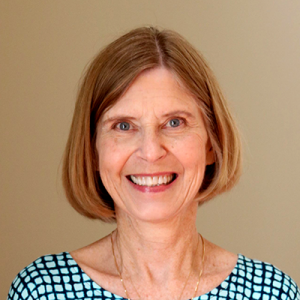 Jan Bays started her culture change journey by connecting culture change and the rehabilitation community. While Vice President of Clinical Services of Creative Health Solutions (CHS), she became an Eden Associate and led CHS to become a Person Directed Therapy Company. After over 35 years as a clinician and manager in geriatric rehabilitation, Jan turned her efforts to advocacy for people living with dementia. She had the opportunity to partner with her daughter to develop a relationship-based intergenerational community consisting of assisted living with specialty in memory care, a preschool and a day visitor program that employs person-centered practices. Jan is a founding member of Dementia Friendly Bloomington which fosters innovative support for persons living with dementia in that community. She is an active supporter of service learning, which gives students opportunities to develop relationships with elders, at Indiana University. She is an active member of the Dementia Action Alliance, serving as a member of the Board of Directors, Chair of the Optimizing Well Being Workgroup and of the Brain Health Committee. Jan Bays started her culture change journey by connecting culture change and the rehabilitation community. While Vice President of Clinical Services of Creative Health Solutions (CHS), she became an Eden Associate and led CHS to become a Person Directed Therapy Company. After over 35 years as a clinician and manager in geriatric rehabilitation, Jan turned her efforts to advocacy for people living with dementia. She had the opportunity to partner with her daughter to develop a relationship-based intergenerational community consisting of assisted living with specialty in memory care, a preschool and a day visitor program that employs person-centered practices. Jan is a founding member of Dementia Friendly Bloomington which fosters innovative support for persons living with dementia in that community. She is an active supporter of service learning, which gives students opportunities to develop relationships with elders, at Indiana University. She is an active member of the Dementia Action Alliance, serving as a member of the Board of Directors, Chair of the Optimizing Well Being Workgroup and of the Brain Health Committee.
|

 Jim Kinsey is the Vice President of Continuum of Care Services at Planetree International, a not-for-profit organization that provides education and information in a collaborative community of healthcare organizations, facilitating efforts to create person-centered care in healing environments. In his role, Jim is responsible for coaching and directing organizations to implement the Planetree Framework of person-centered care. He specializes in complex healthcare system implementation, long-term care environments and other post-acute environments. Jim is a strong advocate for reducing/eliminating biased care and enhancing the skills of professionals in the field of aging. He started in healthcare as a nursing assistant, later attending nursing school and has worked in a variety of settings including high risk acute care, sub-acute and long-term care. He is a co-author of Planetree’s Long Term Care Improvement Guide, co-authored and served as content reviewer for Managing the Long-Term Care Facility: Practical Approaches to Providing Quality Care First Edition, (Perley, Editor). Jim will repeat this role for the 2nd Edition in 2020 and add chapters on person-centered care and resident move in. He is a sought-after speaker and educator for topics associated with person-centered care implementation and has created and implemented comprehensive staff, physician and leadership training curricula for Planetree.
Jim Kinsey is the Vice President of Continuum of Care Services at Planetree International, a not-for-profit organization that provides education and information in a collaborative community of healthcare organizations, facilitating efforts to create person-centered care in healing environments. In his role, Jim is responsible for coaching and directing organizations to implement the Planetree Framework of person-centered care. He specializes in complex healthcare system implementation, long-term care environments and other post-acute environments. Jim is a strong advocate for reducing/eliminating biased care and enhancing the skills of professionals in the field of aging. He started in healthcare as a nursing assistant, later attending nursing school and has worked in a variety of settings including high risk acute care, sub-acute and long-term care. He is a co-author of Planetree’s Long Term Care Improvement Guide, co-authored and served as content reviewer for Managing the Long-Term Care Facility: Practical Approaches to Providing Quality Care First Edition, (Perley, Editor). Jim will repeat this role for the 2nd Edition in 2020 and add chapters on person-centered care and resident move in. He is a sought-after speaker and educator for topics associated with person-centered care implementation and has created and implemented comprehensive staff, physician and leadership training curricula for Planetree.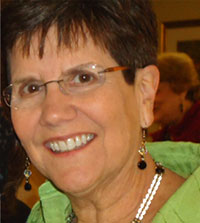 Judi Booker is a resident of Shenandoah Valley Westminster Canterbury (SVWC). Ninety-nine-year-old parents have lived in a private Assisted Living Community for 7 years and Judi supervises their care. She is a retired Licensed Professional Counselor (LPC) with over 25 years of facilitating individual and group therapy in a Community Services setting. At retirement, Judi was managing two CARF-accredited Community Services outpatient substance abuse treatment programs and was tasked with meeting regulatory and statutory requirements of locality, state, and federal government. She was an active member in a department-wide change-agent team created to change department culture to better serve those with co-occurring mental health and substance abuse disorders.
Judi Booker is a resident of Shenandoah Valley Westminster Canterbury (SVWC). Ninety-nine-year-old parents have lived in a private Assisted Living Community for 7 years and Judi supervises their care. She is a retired Licensed Professional Counselor (LPC) with over 25 years of facilitating individual and group therapy in a Community Services setting. At retirement, Judi was managing two CARF-accredited Community Services outpatient substance abuse treatment programs and was tasked with meeting regulatory and statutory requirements of locality, state, and federal government. She was an active member in a department-wide change-agent team created to change department culture to better serve those with co-occurring mental health and substance abuse disorders.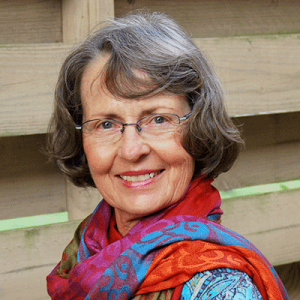 Mary Jane Lee is a retired Registered Nurse with certifications in Hospice and Palliative Care Nursing and Holistic Nursing. She worked as a nurse and volunteer in hospice care and in a state-of-the-art adult care center with focus on whole person well-being and client-centered care for thirty years. Mary Jane introduced hospice and holistic concepts in caring to health care providers and volunteers. She taught Therapeutic Touch to staff and volunteers for symptom management in hospice, hospital, and adult care settings. Mary Jane recently became a resident at Shenandoah Valley Westminster Canterbury in Winchester, VA and is already volunteering as an observer and note taker for the Conversations re: Resident Experience in the health care and memory support areas. In serving fresh water to residents weekly in these areas, Mary Jane is learning how their lives may be impacted positively with increased awareness to individual needs and desires. She also frequently visits residents in those areas to assist them in doing things that they have difficulty doing by themselves.
Mary Jane Lee is a retired Registered Nurse with certifications in Hospice and Palliative Care Nursing and Holistic Nursing. She worked as a nurse and volunteer in hospice care and in a state-of-the-art adult care center with focus on whole person well-being and client-centered care for thirty years. Mary Jane introduced hospice and holistic concepts in caring to health care providers and volunteers. She taught Therapeutic Touch to staff and volunteers for symptom management in hospice, hospital, and adult care settings. Mary Jane recently became a resident at Shenandoah Valley Westminster Canterbury in Winchester, VA and is already volunteering as an observer and note taker for the Conversations re: Resident Experience in the health care and memory support areas. In serving fresh water to residents weekly in these areas, Mary Jane is learning how their lives may be impacted positively with increased awareness to individual needs and desires. She also frequently visits residents in those areas to assist them in doing things that they have difficulty doing by themselves.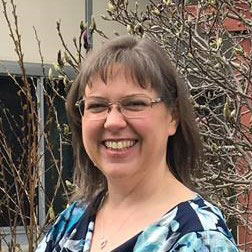 Jenny Brown has been working in the field of Elder Care since 1995, beginning as a Music Therapist in private practice before moving into the field of Recreation. She received her Bachelor of Music Therapy from the University of Windsor, as well as a diploma in Leadership in Long-Term Care and Retirement Living from Conestoga College. In her work, Jenny supports the Recreation Team and the Village to provide meaningful recreation opportunities and life enrichment for the Neighbours who live at Aspen Lake. She is passionate about “Putting Living First” and enjoys sharing this passion with others through her work as Co-Chair of the Support Advisory Team (a team which acts as “wise counsel” to Schlegel Villages in supporting Culture Change initiatives) and as a member of her village’s Village Advisory Team.
Jenny Brown has been working in the field of Elder Care since 1995, beginning as a Music Therapist in private practice before moving into the field of Recreation. She received her Bachelor of Music Therapy from the University of Windsor, as well as a diploma in Leadership in Long-Term Care and Retirement Living from Conestoga College. In her work, Jenny supports the Recreation Team and the Village to provide meaningful recreation opportunities and life enrichment for the Neighbours who live at Aspen Lake. She is passionate about “Putting Living First” and enjoys sharing this passion with others through her work as Co-Chair of the Support Advisory Team (a team which acts as “wise counsel” to Schlegel Villages in supporting Culture Change initiatives) and as a member of her village’s Village Advisory Team.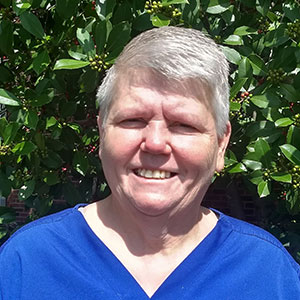 When Vicky Buckhannan’s grandfather was diagnosed with Alzheimer’s disease, he was admitted into a nursing home in Lineville, Alabama. Vicky set her heart on being the one to take care of him, so she became a CNA. That was 26 years ago, and Vicky has been caring for older adults ever since. Vicky has been on the team at Fair Haven for almost a year and a half. She spends most of her work day caring for residents, but also enjoys occasional duties as the relief person for the Central Supply Director. Vicky is a graduate of Cleburne County High School in Heflin, AL, and attended Jacksonville State University for two years.
When Vicky Buckhannan’s grandfather was diagnosed with Alzheimer’s disease, he was admitted into a nursing home in Lineville, Alabama. Vicky set her heart on being the one to take care of him, so she became a CNA. That was 26 years ago, and Vicky has been caring for older adults ever since. Vicky has been on the team at Fair Haven for almost a year and a half. She spends most of her work day caring for residents, but also enjoys occasional duties as the relief person for the Central Supply Director. Vicky is a graduate of Cleburne County High School in Heflin, AL, and attended Jacksonville State University for two years.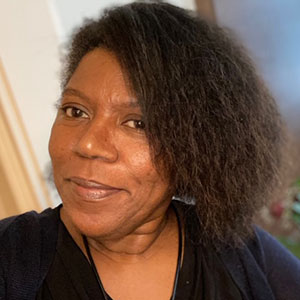 Brigitte Marc, LPN, attended nursing school in NTC and then in August, 2015, she came to work at Park Springs in Atlanta, Georgia. If you ask her about her work, she will tell you that she loves being a nurse in long-term care. Caring for the elderly is her branch. When COVID-19 struck this past spring, She and her husband made a pact that she would shelter in place at Park Springs during their “lock-in” and he would stay safely at home.
Brigitte Marc, LPN, attended nursing school in NTC and then in August, 2015, she came to work at Park Springs in Atlanta, Georgia. If you ask her about her work, she will tell you that she loves being a nurse in long-term care. Caring for the elderly is her branch. When COVID-19 struck this past spring, She and her husband made a pact that she would shelter in place at Park Springs during their “lock-in” and he would stay safely at home.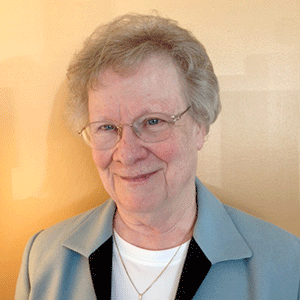 has thirty-one years’ experience in advocacy and leadership in aging services. She has directed communities at all levels of care. Over the past several years, she has worked directly with Sisters across the country; visited convent settings to learn about retirement programs; consulted with elected leadership teams; and presented at regional and national settings. A retired Licensed Nursing Home Administrator, Sr. Imelda has administered all levels of LTC communities. She has visited convent retirement centers across the country, gaining a general knowledge of programs, attitudes and needs; consulted with leadership te
has thirty-one years’ experience in advocacy and leadership in aging services. She has directed communities at all levels of care. Over the past several years, she has worked directly with Sisters across the country; visited convent settings to learn about retirement programs; consulted with elected leadership teams; and presented at regional and national settings. A retired Licensed Nursing Home Administrator, Sr. Imelda has administered all levels of LTC communities. She has visited convent retirement centers across the country, gaining a general knowledge of programs, attitudes and needs; consulted with leadership te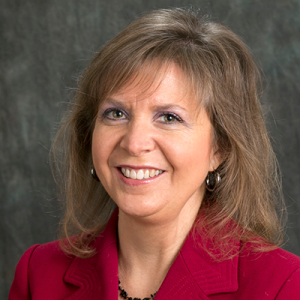 Amy Kotterman RD, LD graduated from The Ohio State University with a Bachelor of Science degree in Medical Dietetics. She is the Director of Hospitality Services for United Church Homes (UCH) where she has been employed for 27 years. Amy provides guidance and assistance to the communities to create a home environment that supports abundant aging and culture change initiatives. Amy is leading the culture change transformation throughout UCH through education and implementation of person-directed initiatives including the Hospitality: I LIVE it program, UCH culture change vocabulary, Comfort Matters dementia education program and oversees resident engagement and satisfaction. In addition, Amy works with the directors of dining services and culinary chefs to enhance the dining experience for the UCH communities.
Amy Kotterman RD, LD graduated from The Ohio State University with a Bachelor of Science degree in Medical Dietetics. She is the Director of Hospitality Services for United Church Homes (UCH) where she has been employed for 27 years. Amy provides guidance and assistance to the communities to create a home environment that supports abundant aging and culture change initiatives. Amy is leading the culture change transformation throughout UCH through education and implementation of person-directed initiatives including the Hospitality: I LIVE it program, UCH culture change vocabulary, Comfort Matters dementia education program and oversees resident engagement and satisfaction. In addition, Amy works with the directors of dining services and culinary chefs to enhance the dining experience for the UCH communities. Angel Duncan is involved in Alzheimer’s disease research as a clinician in clinical trials, director of education and therapist to caregivers and people living with early onset and early stage dementia. She provides art therapy training in arts related programming for dementia populations and establishes museum art tours around the country and internationally. Her current affiliations are with the Yale University Art Gallery, Yale Alzheimer’s Disease Research Center and Albertus Magnus College in developing an early stage dementia museum program. She consults with the National Alliance in Mental Illness (NAMI), AARP and YMCA chapters throughout the northeast coastal region in brain health initiatives for successful living.
Angel Duncan is involved in Alzheimer’s disease research as a clinician in clinical trials, director of education and therapist to caregivers and people living with early onset and early stage dementia. She provides art therapy training in arts related programming for dementia populations and establishes museum art tours around the country and internationally. Her current affiliations are with the Yale University Art Gallery, Yale Alzheimer’s Disease Research Center and Albertus Magnus College in developing an early stage dementia museum program. She consults with the National Alliance in Mental Illness (NAMI), AARP and YMCA chapters throughout the northeast coastal region in brain health initiatives for successful living. Brian LeBlanc grew up in New Orleans, LA and has lived in the Gulf Coast area since then. He found his niche in the professional world as a Marketing and Public Relations Executive. Diagnosed in October of 2014 with early-onset Alzheimer’s Disease and no longer able to work, Brian made a career change by using his voice to spread awareness and education about living with Alzheimer’s disease. He now spends his time as a keynote speaker and session presenter at international, national and local conferences, seminars and workshops. He also teaches Crisis Intervention Team Training to law enforcement as to how to recognize individuals living with a dementia-related illness.
Brian LeBlanc grew up in New Orleans, LA and has lived in the Gulf Coast area since then. He found his niche in the professional world as a Marketing and Public Relations Executive. Diagnosed in October of 2014 with early-onset Alzheimer’s Disease and no longer able to work, Brian made a career change by using his voice to spread awareness and education about living with Alzheimer’s disease. He now spends his time as a keynote speaker and session presenter at international, national and local conferences, seminars and workshops. He also teaches Crisis Intervention Team Training to law enforcement as to how to recognize individuals living with a dementia-related illness.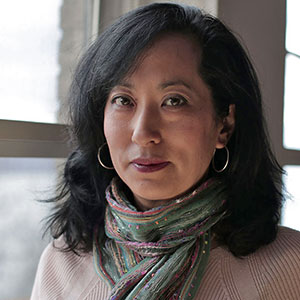 Risa Morimoto
Risa Morimoto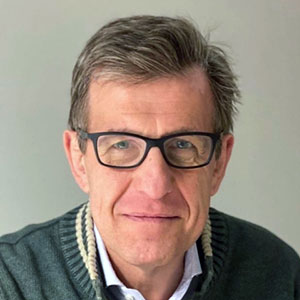 Josep de Marti, who holds a Law Graduate with a Master’s degree in Social Gerontology, worked for 10 years (1991 to 2000) as a nursing home inspector for the Catalonia Regional Government. In 2000, he set up a web site, Inforesidencias.com, addressed to the Spanish nursing home industry and in 2005 a consultancy and training company, Eai Consultoria. Josep is an associate professor at two Spanish Universities, teaching in post graduate degree programs in the area of Social Gerontology and Nursing Home management. He also directs Dependencia.info, a newsletter about care for elders with 8.000 subscribers.
Josep de Marti, who holds a Law Graduate with a Master’s degree in Social Gerontology, worked for 10 years (1991 to 2000) as a nursing home inspector for the Catalonia Regional Government. In 2000, he set up a web site, Inforesidencias.com, addressed to the Spanish nursing home industry and in 2005 a consultancy and training company, Eai Consultoria. Josep is an associate professor at two Spanish Universities, teaching in post graduate degree programs in the area of Social Gerontology and Nursing Home management. He also directs Dependencia.info, a newsletter about care for elders with 8.000 subscribers.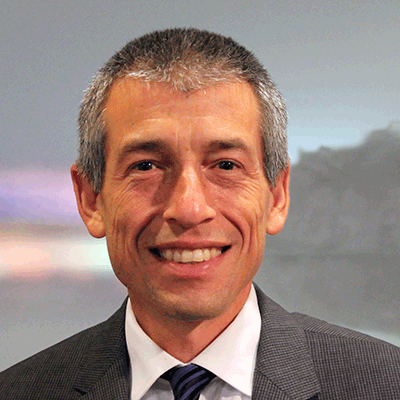 Dan Levitt is an acclaimed international speaker, elder care leader, writer, and gerontologist, specializing in helping others to create better lives for seniors. Dan’s purpose is to teach people how to transform the lives of older adults across the globe. As a popular professional speaker, he has delivered inspiring keynote speeches impacting thousands of people on four continents. Dan doesn’t tell people where to go but guides them in the direction of where they need to go. His talks leave the audience with a new mindset on aging needed to thrive in the 21st century.
Dan Levitt is an acclaimed international speaker, elder care leader, writer, and gerontologist, specializing in helping others to create better lives for seniors. Dan’s purpose is to teach people how to transform the lives of older adults across the globe. As a popular professional speaker, he has delivered inspiring keynote speeches impacting thousands of people on four continents. Dan doesn’t tell people where to go but guides them in the direction of where they need to go. His talks leave the audience with a new mindset on aging needed to thrive in the 21st century.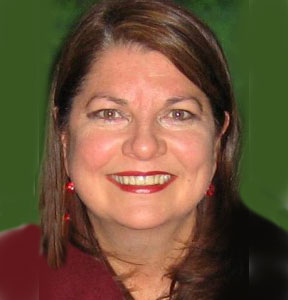 Sally Hopkins is the Executive Director of the Eden Alternative in Australia, New Zealand and Southeast Asia. As an Eden Regional Coordinator, working with a volunteer Board, Sally is responsible for the strategic direction, operations and growth of the Eden Alternative (through Eden Registry & Training) in three Regions. This includes, and is not limited to financial sustainability, education, marketing. She works with a number of homes, community and disability organizations who are operationalizing the Eden Alternative in their organizations. The strategic direction of her organization, in partnership with other Eden Regions around the globe is to change the face of aging.
Sally Hopkins is the Executive Director of the Eden Alternative in Australia, New Zealand and Southeast Asia. As an Eden Regional Coordinator, working with a volunteer Board, Sally is responsible for the strategic direction, operations and growth of the Eden Alternative (through Eden Registry & Training) in three Regions. This includes, and is not limited to financial sustainability, education, marketing. She works with a number of homes, community and disability organizations who are operationalizing the Eden Alternative in their organizations. The strategic direction of her organization, in partnership with other Eden Regions around the globe is to change the face of aging.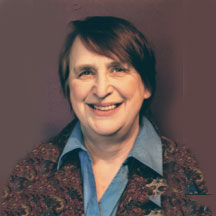 A pioneer and champion of the Household Model, LaVrene Norton has been guiding organizations on their culture change journeys since 1984. She is recognized as the nation’s foremost organizational change facilitator in long-term care and has taken her expertise to Ireland and Australia as well. In addition to building curriculum for the broad series of Action Pact workshops, intensives and consulting, LaVrene has led the Action Pact team in the development of a deep catalog of culture change and Household Model literature, workbooks and DVDs, most notably In Pursuit of the Sunbeam which she co-authored with Steve Shields. She holds a Masters of Social Work.
A pioneer and champion of the Household Model, LaVrene Norton has been guiding organizations on their culture change journeys since 1984. She is recognized as the nation’s foremost organizational change facilitator in long-term care and has taken her expertise to Ireland and Australia as well. In addition to building curriculum for the broad series of Action Pact workshops, intensives and consulting, LaVrene has led the Action Pact team in the development of a deep catalog of culture change and Household Model literature, workbooks and DVDs, most notably In Pursuit of the Sunbeam which she co-authored with Steve Shields. She holds a Masters of Social Work. For the past nine years, Emily Dieppa has worked to empower the direct care workforce by creating pathways to economic sustainability and addressing the systemic challenges facing long-term care workers. By creating a home care training center in Detroit, Emily connected incumbent personal care aides to advanced training, higher wages, and an accessible career ladder. She did this work in partnership with diverse stakeholders, including home care agencies, nursing homes, city officials, and labor unions. Emily worked closely with PHI to develop the program’s curriculum and train a multi-disciplinary instructor team. As Chief of Staff for a healthcare workforce organization, Emily has extensive experience leading organizational development and culture change during times of transition. Rooted in mission-driven design, she has created and facilitated internal staff development programs and leadership conferences for over 400 healthcare workers to foster both personal and professional growth. Emily has long been a vocal advocate for quality long-term care. Is an advisory board member for the IMPART Alliance with leaders across Michigan to address an ever-growing caregiver shortage and build the necessary infrastructure for a statewide personal care aide training program. She has also worked with Michigan’s Olmstead Coalition to draft policy recommendations for the state’s Medicaid-funded services.
For the past nine years, Emily Dieppa has worked to empower the direct care workforce by creating pathways to economic sustainability and addressing the systemic challenges facing long-term care workers. By creating a home care training center in Detroit, Emily connected incumbent personal care aides to advanced training, higher wages, and an accessible career ladder. She did this work in partnership with diverse stakeholders, including home care agencies, nursing homes, city officials, and labor unions. Emily worked closely with PHI to develop the program’s curriculum and train a multi-disciplinary instructor team. As Chief of Staff for a healthcare workforce organization, Emily has extensive experience leading organizational development and culture change during times of transition. Rooted in mission-driven design, she has created and facilitated internal staff development programs and leadership conferences for over 400 healthcare workers to foster both personal and professional growth. Emily has long been a vocal advocate for quality long-term care. Is an advisory board member for the IMPART Alliance with leaders across Michigan to address an ever-growing caregiver shortage and build the necessary infrastructure for a statewide personal care aide training program. She has also worked with Michigan’s Olmstead Coalition to draft policy recommendations for the state’s Medicaid-funded services.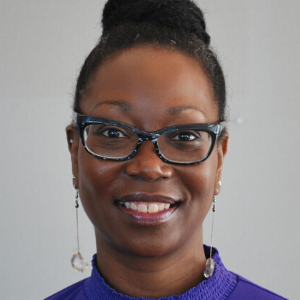 As one of PHI’s Workforce Development Specialists and trainers, Cassandra Martin-Himmons’ role is to support the creation of workshops and other initiatives to enhance the professional development of direct care workers and their supervisors. As such, she facilitates and contributes to the design of skill building workshops in addition to facilitating train the trainer workshops to teach PHI signature curricula using adult learner centered teaching methods. She also designs and conducts focus groups with client organizations to inform training design and workforce development interventions. Prior to PHI, Cassandra worked within the fields of healthcare and workforce development. While at Madison Strategies Group, Cassandra was the co-developer of the CareerLift program which helped individuals with limited access to educational and work opportunities maintain employment and advance in their careers. Cassandra’s professional interests lie in workplace wellness and in assisting individuals with navigating their way through life’s challenges that impact their ability to work. Cassandra, a licensed social worker, earned her MSW degree from Columbia University and has 15 years of experience within the field of social services. She is the former Vice President of Education for the Harlem branch of Toastmasters International and enjoys scrapbooking and traveling in her spare time.
As one of PHI’s Workforce Development Specialists and trainers, Cassandra Martin-Himmons’ role is to support the creation of workshops and other initiatives to enhance the professional development of direct care workers and their supervisors. As such, she facilitates and contributes to the design of skill building workshops in addition to facilitating train the trainer workshops to teach PHI signature curricula using adult learner centered teaching methods. She also designs and conducts focus groups with client organizations to inform training design and workforce development interventions. Prior to PHI, Cassandra worked within the fields of healthcare and workforce development. While at Madison Strategies Group, Cassandra was the co-developer of the CareerLift program which helped individuals with limited access to educational and work opportunities maintain employment and advance in their careers. Cassandra’s professional interests lie in workplace wellness and in assisting individuals with navigating their way through life’s challenges that impact their ability to work. Cassandra, a licensed social worker, earned her MSW degree from Columbia University and has 15 years of experience within the field of social services. She is the former Vice President of Education for the Harlem branch of Toastmasters International and enjoys scrapbooking and traveling in her spare time.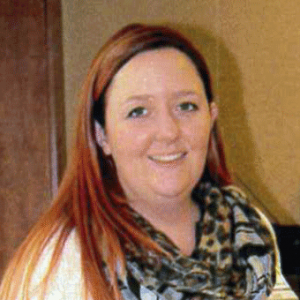 Victoria Crumbie (Tori) is the Director of Recreation for the Abramson Center for Jewish Life, North Wales, PA. She is responsible for the development of the Recreation Department to expand the scope of programming and incorporate therapeutic intent. She supervises the MATCH Tracker Quality Improvement initiative to enhance person-centered care. Tori develops the calendar of activities to include opportunities for residents to fulfill a vast array of preferences at any stage in life. In addition, she maintains the Recreation Department budget lines and provides supervision to the Program Assistants and collegiate interns to establish goals for future professional development. Finally, she plans, organizes, and implements organization-wide special events for residents, family, and staff.
Victoria Crumbie (Tori) is the Director of Recreation for the Abramson Center for Jewish Life, North Wales, PA. She is responsible for the development of the Recreation Department to expand the scope of programming and incorporate therapeutic intent. She supervises the MATCH Tracker Quality Improvement initiative to enhance person-centered care. Tori develops the calendar of activities to include opportunities for residents to fulfill a vast array of preferences at any stage in life. In addition, she maintains the Recreation Department budget lines and provides supervision to the Program Assistants and collegiate interns to establish goals for future professional development. Finally, she plans, organizes, and implements organization-wide special events for residents, family, and staff.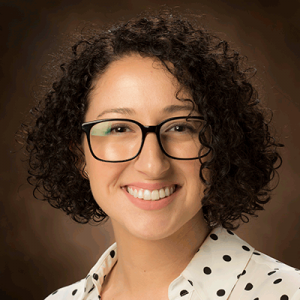 Alex Heppner, BSW, received her Bachelor’s in Social Work from Bradley University. Ms. Heppner has experience with care planning process in both long-term care and adult day program settings. She is currently the Project Manager for the PELI-Can Project tasked with assisting Ohio nursing home providers implementing the Preferences for Everyday Living Inventory (PELI). Alex communicates with nursing home providers to identify barriers and facilitators of PELI implementation and manages the project’s “helpline” to respond to provider inquiries. She also assists with the development of training videos and tip sheets to aid providers. Additionally, she manages the project’s social media accounts and electronic newsletter for dissemination of implementation tips, updates, and related information.
Alex Heppner, BSW, received her Bachelor’s in Social Work from Bradley University. Ms. Heppner has experience with care planning process in both long-term care and adult day program settings. She is currently the Project Manager for the PELI-Can Project tasked with assisting Ohio nursing home providers implementing the Preferences for Everyday Living Inventory (PELI). Alex communicates with nursing home providers to identify barriers and facilitators of PELI implementation and manages the project’s “helpline” to respond to provider inquiries. She also assists with the development of training videos and tip sheets to aid providers. Additionally, she manages the project’s social media accounts and electronic newsletter for dissemination of implementation tips, updates, and related information.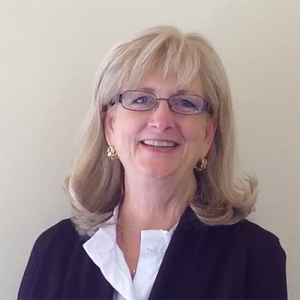 Karen Love is the Executive Director of the Dementia Action Alliance. She leads persons living with dementia, care partners and professionals in advocacy, education, and support for living well with dementia. Karen is a leader in person-centered practices in dementia care who advocates for treating dementia as a disability and using compensatory strategies to accommodate for changing abilities as a right. She led the DAA project to develop Best Practices for Living Well with Dementia and then created the partnership with The Eden Alternative to create the Raising the Bar Practice Guidelines to direct care in the Assisted Living setting. As a former long-term care (LTC) administrator, Karen has first-hand experience with person-centered care practices; she transformed several LTC communities to inculcating these principles and practices. Karen served as co-investigator on seven research projects (funded by the National Institute on Aging, U.S. Administration on Aging, and the Commonwealth of Virginia’s Alzheimer’s Disease and Related Dementia Research Award) to study and test person-centered practices. She has numerous articles about person-centered dementia care published in peer-reviewed journals and wrote a manual about person-centered practices for the National Association of Boards of Examiners of Long-Term Care Administrators that is used to educate administrators. Since 2011, Karen has championed person- and relational-centered dementia care practices nationally through the Dementia Action Alliance.
Karen Love is the Executive Director of the Dementia Action Alliance. She leads persons living with dementia, care partners and professionals in advocacy, education, and support for living well with dementia. Karen is a leader in person-centered practices in dementia care who advocates for treating dementia as a disability and using compensatory strategies to accommodate for changing abilities as a right. She led the DAA project to develop Best Practices for Living Well with Dementia and then created the partnership with The Eden Alternative to create the Raising the Bar Practice Guidelines to direct care in the Assisted Living setting. As a former long-term care (LTC) administrator, Karen has first-hand experience with person-centered care practices; she transformed several LTC communities to inculcating these principles and practices. Karen served as co-investigator on seven research projects (funded by the National Institute on Aging, U.S. Administration on Aging, and the Commonwealth of Virginia’s Alzheimer’s Disease and Related Dementia Research Award) to study and test person-centered practices. She has numerous articles about person-centered dementia care published in peer-reviewed journals and wrote a manual about person-centered practices for the National Association of Boards of Examiners of Long-Term Care Administrators that is used to educate administrators. Since 2011, Karen has championed person- and relational-centered dementia care practices nationally through the Dementia Action Alliance.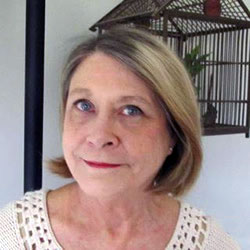 Paulan Gordon is living well with Vascular Dementia. She lives resiliency and shares that attitude with others. She is committed and actively involved in creating a world where people can live well with dementia through example, advocacy and mentoring. She is a contributor and co-editor for Raising the Bar: Creating a Better Society in which to Live with Dementia.
Paulan Gordon is living well with Vascular Dementia. She lives resiliency and shares that attitude with others. She is committed and actively involved in creating a world where people can live well with dementia through example, advocacy and mentoring. She is a contributor and co-editor for Raising the Bar: Creating a Better Society in which to Live with Dementia.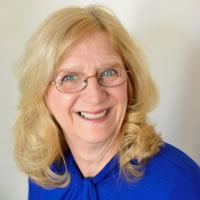 Laurie Scherrer is on the Advisory Board and the Board of Directors for the Dementia Action Alliance. She lives well with dementia and shares that message with others. She is committed and actively involved to creating a world where people can live well with dementia through example, advocacy and mentoring. She is a contributor and co-editor for Raising the Bar: Creating a Better Society in which to Live with Dementia.
Laurie Scherrer is on the Advisory Board and the Board of Directors for the Dementia Action Alliance. She lives well with dementia and shares that message with others. She is committed and actively involved to creating a world where people can live well with dementia through example, advocacy and mentoring. She is a contributor and co-editor for Raising the Bar: Creating a Better Society in which to Live with Dementia.